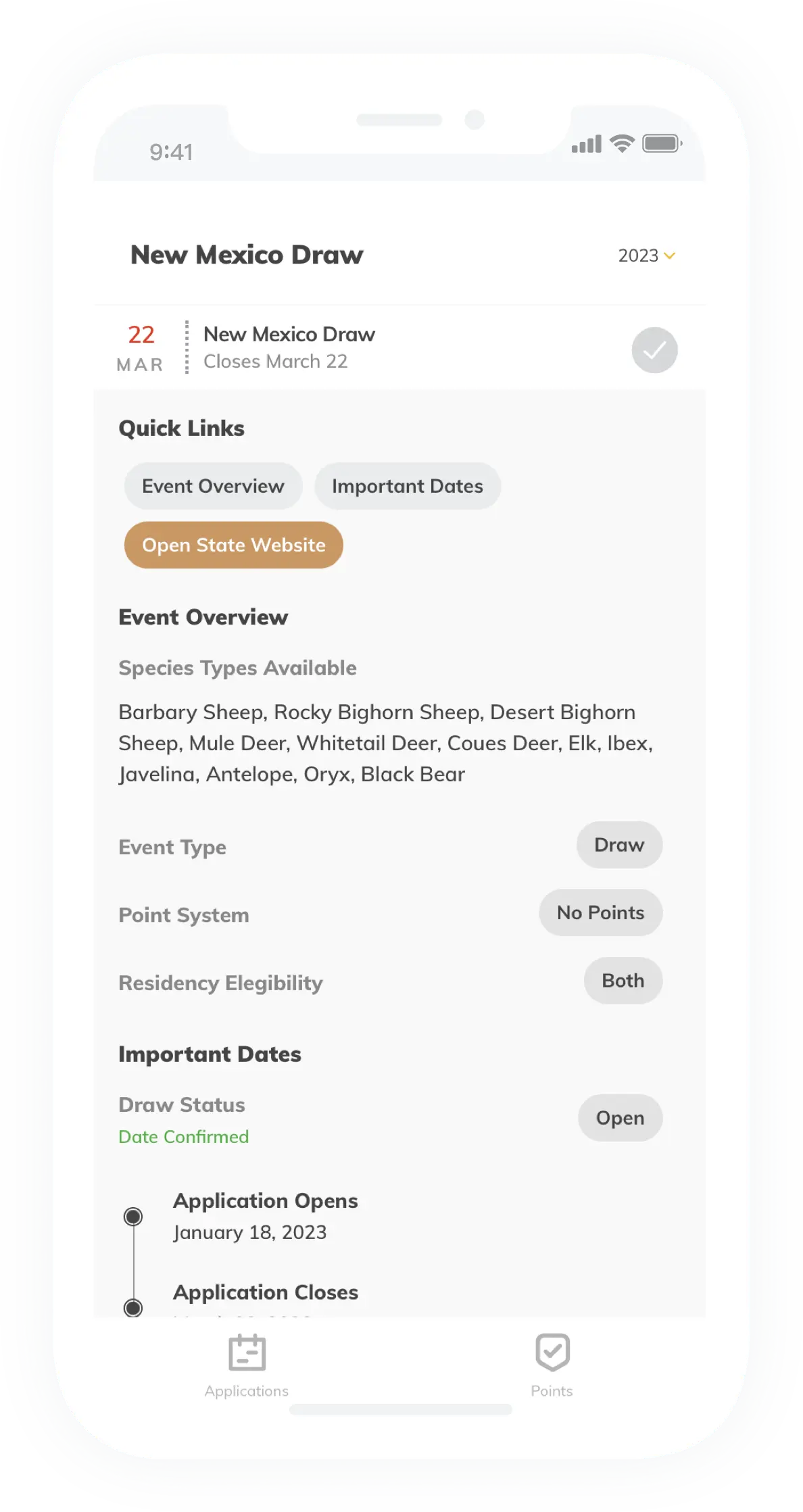Quick Links
Kansas Hunting Overview
Kansas is a popular destination for big game hunting, attracting both resident and non-resident hunters every year. The state is home to a variety of species, including mule deer, whitetail deer, antelope, and elk. The Kansas Department of Wildlife, Parks and Tourism oversees the management of these species.
Limited opportunity Kansas hunting tags are regulated by a draw system, with hunters applying for permits through a lottery process. The draw system is open to both residents and non-residents, with the latter accounting for a significant portion of the hunting community in Kansas. Kansas is a top destination for big game hunting, with approximately 250,000 annual hunters including nearly 80,000 non-residents.
Big Game Species
Kansas offers big game hunting opportunities for Whitetail Deer, Mule Deer, Antelope, and Elk. Whitetail deer represent the largest population in the state, at approximately 700,000 and greatest hunting opportunity by numbers for both residents and non-residents. Mule deer number approximately 20,000, primarily in the western portion of the state. Both residents and non-residents are able hunt mule deer, but opportunities are limited and require additional application steps for non-residents, detailed in the Kansas non-resident deer draw summary. Elk and Antelope populations in the state are small and limited to residents or non-resident land owners.
Draw and OTC Sales and Dates
| Event | Species | Opening | Deadline |
|---|---|---|---|
| Kansas Non-Resident Deer Draw | Mule Deer, Whitetail Deer | April 1, 2025 12:00 AM CST | April 25, 2025 11:59 PM CST |
| Kansas Resident Elk, Deer, and Antelope Draw | Elk, Pronghorn, Mule Deer, Whitetail Deer | May 13, 2025 12:00 AM CST | June 13, 2025 11:59 PM CST |
| Kansas Spring Turkey Draw | Turkey | January 14, 2025 12:00 AM CST | February 14, 2025 11:59 PM CST |
Kansas Hunting Point System
Kansas uses primarily a preference point system, though has bonus points for Elk. Preference points are given to applicants who are unsuccessful in draws for hunting permits. For those who do not wish to apply for a permit but want to purchase a preference point, they can select the “preference point only” option. Only one preference point can be obtained per year. These preference points remain on file for five years from the last date a point was issued or purchased. If a hunter fails to make at least one application or purchase one point within five consecutive years, points will be reset to zero. In group applications the lowest number of preference points from the group is used.
Given the low quantity of tags allocated and high tag demand, elk permits use a standard bonus point system.
Kansas Point Types
| Species | Point Type | Residency |
|---|---|---|
| Spring Turkey | Preference | Both |
| Pronghorn | Preference | Residents |
| Elk | Bonus | Residents |
| Whitetail Deer (Non-resident) | Preference | Non-residents |
| Deer - Combined (Resident) | Preference | Residents |
How to build points
Points are acquired through draws, and there is no opportunity to acquire them outside of the draw. A valid hunting license is required to acquire points.
Tags, Licenses, and Pricing
A valid hunting license is required to apply for the draw, including for purchasing points only. Non-resident deer applications include a non-refundable $27.50 fee. Fees for resident and non-resident licenses and permits are in the table below.
General License Fees
| Item | Resident Price | Non-Resident Price |
|---|---|---|
| Annual hunting license | $27.50 | $127.50 |
Species Specific Fees
| Item | Resident Price (2023*) | Non-Resident Price |
|---|---|---|
| Deer Draw Permit | $52.50 | $477.50 |
| General Deer OTC | $42.50 | N/A |
| Mule Deer Stamp Fee | N/A | $150.00 |
| Deer Preference Point Only | $12.50 | $27.50 |
| Antelope Draw Permit | $62.50 | N/A |
| Archery Antelope General | $52.50 | N/A |
| Antelope Preference Point Only | $12.50 | N/A |
| Elk Permit | $302.50 | N/A |
| Antlerless Elk | $152.50 | N/A |
| Elk Preference Point Only | $12.50 | N/A |
Kansas Hunting Regulations
Kansas hunter requirements and regulations are available here.
Hunters Education
- Hunters Education is required for individuals born on or after July 1, 1957, except that anyone 15 years old or younger may hunt without hunter education certification provided they are under the direct supervision of an adult 18 years old or older. Hunter Education Certification issued by any state, Canadian Province, or some foreign jurisdictions are deemed to meet the requirements of Kansas Law.
- Individuals 16 or older may purchase a two-time purchase deferral of the Hunter Education requirements by purchasing an Apprentice hunting license. Apprentice hunting license holders must hunt under the supervision of a licensed hunter age 18 or older.
Age Restrictions
- There is no minimum age to apply for or receive a big game permit in Kansas.
Archery Limitations
- Mechanical broadheads and lighted nocks are allowed in Kansas.
Group Hunting
Hunters may apply as a group in Kansas, with up to five applicants for the same unit and weapon choice and each person will make an individual application. The first applicant in the group will select the “create group” option and will receive a group number. Subsequent applicants will select the “join group” option and enter the group number. The overall group will be drawn based on the lowest preference point in the group. Applicants will be asked to select their preferred permit delivery method (print and mail or electronic delivery through the Go Outdoors Kansas app) at the time of application.
Kansas Hunting FAQ
Waiting Periods
Youth Hunting
Landowner Tag Options
Weapon Restrictions
Return / Transfer Tags


